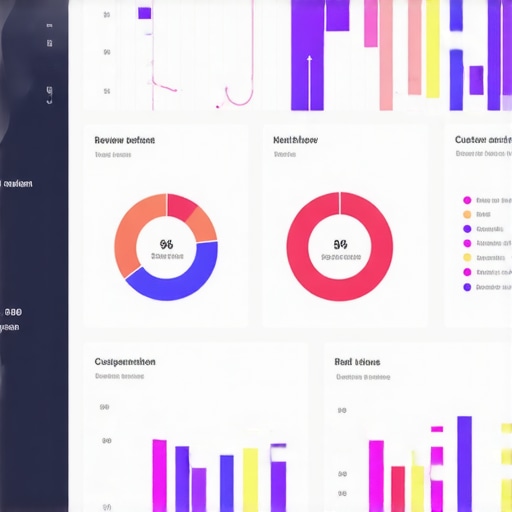In the fiercely competitive landscape of local SEO, leveraging customer reviews is no longer a mere reputation management tactic but a sophisticated strategy integral to elevating your visibility in local search results. As industry experts emphasize, reviews influence not only consumer trust but also serve as a critical ranking factor within Google’s local algorithmic framework. Understanding the nuanced ways reviews impact local search rankings can empower businesses to craft targeted, data-driven review management strategies that outperform competitors and dominate the coveted Google 3-Pack.
The Complex Interplay Between Customer Feedback and Local SEO Signals
Customer reviews serve as authentic, user-generated content that signals relevance and authority to search engines. Google’s local algorithm evaluates review quantity, quality, and recency, making review acquisition and management a complex, multi-layered process. For instance, a steady stream of positive reviews containing strategic keywords can enhance your business’s topical authority, while recent reviews demonstrate ongoing customer engagement, a key indicator of active local presence.
Advanced Techniques for Integrating Review Data into Your SEO Framework
Successful local SEO campaigns integrate review insights with broader optimization efforts. This includes optimizing your Google Business Profile by strategically incorporating review keywords into your business description and response templates. Moreover, leveraging review management tools like BrightLocal can automate review solicitation and reputation monitoring, ensuring your review profile remains robust and current. The importance of curated, high-quality reviews is underscored by recent studies indicating that review sentiment and keyword relevance significantly influence local ranking fluctuations.
How can businesses systematically leverage customer reviews to outperform local competitors in Google Maps rankings?
Implementing a comprehensive review acquisition and response strategy is essential. This involves actively soliciting reviews through personalized follow-up, encouraging detailed feedback, and responding promptly to all reviews with personalized, keyword-rich responses. Additionally, integrating review data into your local SEO audits can reveal emerging trends and areas for optimization, while also fostering customer trust and loyalty. For a deep dive into effective review management techniques, consult this authoritative guide.
Furthermore, ongoing collaboration with review platforms and citation services, such as expert GMB citation services, can amplify your review signals and improve local search performance. Regularly auditing your review profile ensures compliance with Google’s policies and mitigates the risk of review spam or fake reviews, which can harm your rankings and reputation.
In conclusion, mastering the strategic utilization of customer reviews requires an analytical mindset, technical SEO integration, and a proactive reputation management approach. As local SEO continues to evolve, reviews will remain a pivotal element in securing top rankings and sustained visibility. To enhance your local search dominance, explore the latest industry insights and share your own experiences with review strategies on our platform.
Transforming Review Data into a Strategic SEO Asset
To truly capitalize on customer feedback, businesses must integrate review insights into their broader SEO strategy, transforming raw reviews into actionable data. Advanced sentiment analysis tools can identify emerging themes, pain points, and opportunities to tailor your local SEO efforts effectively. For example, if multiple reviews highlight a specific product feature or service aspect, optimizing your Google Business Profile with targeted keywords related to these themes can boost relevance and rankings.
The Myth of Quantity Over Quality in Reviews
Many assume that accumulating a high volume of reviews automatically leads to better rankings. However, Google’s algorithm prioritizes review quality, relevance, and recency. An influx of generic reviews may not be as impactful as fewer, detailed, keyword-rich reviews that genuinely reflect customer experiences. Encouraging customers to write comprehensive reviews with specific details not only enhances credibility but also signals to search engines that your business is actively engaged with its community.
Expert Framework for Review-Driven Local SEO Dominance
Implementing a structured framework can streamline your review management and SEO integration. This involves setting clear review acquisition goals, utilizing tools like expert GMB citation services to amplify review signals, and establishing a consistent review response protocol. Regularly auditing your review profile with comprehensive tools ensures compliance and mitigates risks associated with fake reviews, safeguarding your reputation and rankings.
How can small businesses leverage advanced review analytics to outperform competitors in local search rankings?
Deploying sophisticated analytics platforms enables businesses to track sentiment trends, identify top-performing review keywords, and uncover customer preferences. These insights can guide content creation, service improvements, and review solicitation strategies, directly impacting local search visibility. Furthermore, integrating review insights with local SEO audits can reveal specific areas for optimization, ensuring your business remains ahead of the curve. For a comprehensive understanding of how to leverage reviews for local dominance, explore this expert guide.
Additionally, engaging actively with reviews on third-party platforms and social media channels can expand your reach and influence. Sharing positive reviews and testimonials on your website and social profiles creates a richer, more authoritative online presence that search engines favor. Remember, consistency and authenticity in review management are key to maintaining top positions in the local pack.
Leveraging Customer Insights Through Cutting-Edge Review Analytics
In the fiercely competitive arena of local SEO, understanding customer feedback goes beyond mere reputation management—it becomes a strategic weapon. Advanced review analytics enable businesses to decode complex sentiment patterns, uncover hidden trends, and predict future customer behaviors. Tools like MonkeyLearn and Lexalytics provide sophisticated sentiment analysis, allowing you to categorize reviews into positive, neutral, or negative with granular insights into specific themes such as service quality, pricing, or ambiance.
For instance, a sudden surge in reviews mentioning “wait times” or “staff friendliness” can direct your operational adjustments, directly influencing your local search prominence. Integrating these insights into your broader SEO and marketing strategies ensures a dynamic approach that adapts to evolving customer preferences and search engine algorithms.
Nuanced Tactics for Enhancing Review Quality and Relevance
While quantity still plays a role, the emphasis shifts towards quality and relevance. Encouraging customers to include specific keywords naturally within their reviews enhances topical authority. For example, prompting reviews that mention your “gluten-free menu” or “24/7 customer support” can reinforce your niche expertise in local searches.
Implementing structured review solicitation protocols, such as post-transaction follow-ups with tailored prompts, ensures detailed feedback. Additionally, leveraging AI-driven review prompts can guide customers to share comprehensive experiences, increasing the likelihood of rich, keyword-rich reviews that resonate with search engine algorithms.
How can businesses ethically utilize review generation tools without risking Google penalties?
Ethical review generation hinges on transparency and genuine engagement. Businesses should avoid incentivizing reviews in a way that compromises authenticity. Instead, focus on authentic requests emphasizing the value of customer feedback, and utilize tools that facilitate honest reviews—such as automated follow-up emails with clear, respectful language. Maintaining compliance with Google’s review policies is paramount; for instance, avoiding fake review schemes and ensuring all reviews are voluntary and truthful. For detailed guidelines, consult Google’s review policies.
Furthermore, integrating review insights with local SEO audits can identify potential policy violations or suspicious review patterns, helping to safeguard your reputation and rankings. Regular training for staff on review ethics and policy adherence fortifies this approach.
Transforming Review Data into Targeted Content and Local Authority Building
Transforming raw reviews into strategic content requires a nuanced approach. Extracting common themes and keywords allows you to create targeted blog posts, FAQ pages, or service pages that address customer queries and highlight your strengths. For example, if reviews frequently mention your “eco-friendly packaging,” develop content around your sustainable practices, boosting both local relevance and authority.
Moreover, leveraging reviews to build local authority involves sharing compelling testimonials on your website, social media, and industry directories. This multi-channel dissemination amplifies your reputation signals, reinforcing your prominence in local searches and fostering community trust.
Integrating Review Strategies with Local SEO Optimization Frameworks
A comprehensive review-driven SEO framework involves setting precise acquisition goals, deploying analytics tools for continuous monitoring, and establishing rapid response protocols. Incorporating machine learning models to predict review sentiment shifts can preempt reputation issues, while automated alerts enable swift corrective actions.
To stay ahead, consider collaborating with expert citation and review management services like GMB citation services, which can enhance your review signals and citation consistency across platforms. Regular audits, including review authenticity checks and compliance assessments, safeguard your rankings from malicious or spam reviews.
Engage with your reviews actively—responding thoughtfully not only boosts customer loyalty but also signals to search engines your commitment to community engagement. As the local SEO landscape evolves, integrating sophisticated review insights into your broader marketing strategy will ensure your business remains a dominant local authority.
The Next Frontier in Local SEO: Mastering Review Analytics for Strategic Advantage
In the ever-evolving landscape of local SEO, the ability to decode complex customer feedback through advanced review analytics can serve as a game-changer, enabling businesses to craft hyper-targeted strategies that surpass competitors. Leveraging sophisticated sentiment analysis tools like MonkeyLearn and Lexalytics, enterprises can dissect review data with granular precision, revealing nuanced patterns in customer sentiment, preferences, and pain points that are often concealed within raw feedback.
Unlocking Hidden Trends Through Multi-Dimensional Data Insights
By integrating review analytics into your broader SEO framework, you can identify emerging themes—such as recurring complaints about wait times or praise for specific service features—that inform your content creation and operational improvements. For example, an uptick in reviews mentioning “fast delivery” or “courteous staff” can guide you to optimize your Google Business Profile with relevant keywords, thereby enhancing topical relevance and search visibility. This proactive approach transforms static review data into a dynamic asset that fuels continuous improvement and strategic agility.
How can businesses ethically utilize review analytics without compromising integrity?
Utilizing review data ethically entails maintaining transparency and ensuring that insights are applied to genuine service enhancements rather than manipulative tactics. Emphasize honest engagement by avoiding any practices that incentivize fake reviews or manipulate sentiment artificially. Instead, employ tools that analyze customer feedback objectively, providing actionable insights that align with your core values and Google’s review policies—such as those outlined by Google Support (Google’s review policies). Regular audits of review analytics ensure your strategies remain compliant and authentic, fostering trust and long-term loyalty.
Embrace this analytical approach to elevate your local SEO, positioning your business as a responsive, customer-centric leader in your community.
Image prompt: A sophisticated dashboard displaying review sentiment analysis with colorful graphs and data points illustrating customer feedback patterns, emphasizing advanced analytics tools in action.
Expert Insights & Advanced Considerations
1. Integrate Multi-Source Data for Superior Customer Insight
Combining reviews from diverse platforms such as Google, Yelp, and industry-specific directories enables a holistic view of customer sentiment, revealing nuanced preferences and pain points that can directly inform local SEO strategies.
2. Leverage Sentiment Trends to Predict Market Shifts
Using sophisticated sentiment analysis tools like Lexalytics can detect subtle shifts in customer feedback, allowing proactive adjustments to service offerings and content, thus maintaining competitive edge in local search rankings.
3. Prioritize Quality and Relevance in Review Acquisition
Encouraging detailed, keyword-rich reviews aligned with your niche enhances topical authority. Structured prompts and AI-driven review solicitation can significantly improve review relevance and SEO impact.
4. Embedding Review Insights into Content Strategy
Transform common review themes into targeted content, such as FAQ pages or blog posts, that address customer concerns and highlight strengths, thereby reinforcing your local authority and relevance in search results.
5. Ethical Use of Review Analytics
Maintain transparency and integrity by focusing on genuine insights. Avoid manipulative tactics and ensure compliance with Google’s review policies, fostering long-term trust and sustainable rankings.
Curated Expert Resources
- Google’s Support Resources: Essential guidelines on review policies and best practices to ensure compliance and authenticity.
- Lexalytics and MonkeyLearn: Leading sentiment analysis platforms offering granular review insights to decode customer feedback effectively.
- BrightLocal: A comprehensive tool for review management, citation building, and local SEO analytics, vital for integrating review insights into SEO efforts.
- Google My Business Optimization Guide: An authoritative resource for maximizing GMB profile impact and leveraging reviews for local search dominance.
Final Expert Perspective
Expert-level review analytics are transforming local SEO from reactive reputation management into a strategic weapon. By integrating multi-source, sentiment-rich data and embedding insights into content and operational improvements, businesses can unlock new levels of local visibility and authority. Embracing ethical, data-driven review strategies ensures sustainable growth and top rankings in Google Maps and local pack results. For those committed to mastery, continuous learning and resource engagement—like this comprehensive guide—are essential. Dive deep, analyze thoroughly, and lead confidently in your local SEO endeavors.





This article really highlights how vital reviews are beyond just building trust—especially when it comes to SEO. I’ve found that businesses who actively analyze review sentiment and incorporate keywords from customer feedback into their profiles tend to see a tangible boost in local rankings. For example, during a recent campaign, we used sentiment analysis tools like MonkeyLearn to identify new service features that customers appreciated, then optimized their Google My Business profile accordingly. The result was a noticeable climb in the local pack rankings within a few weeks.
One challenge I’ve encountered is ensuring reviews remain authentic and ethically gathered, particularly when leveraging AI prompts. Has anyone found effective methods to encourage detailed, keyword-rich reviews without crossing the line into manipulation? I’d love to hear strategies that have worked while staying compliant with Google’s policies.